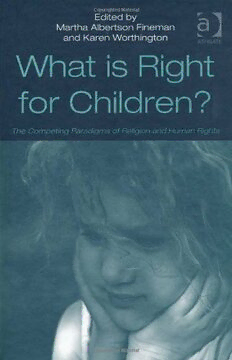
What Is Right for Children? PDF
463 Pages·2009·3.958 MB·English
Most books are stored in the elastic cloud where traffic is expensive. For this reason, we have a limit on daily download.
Preview What Is Right for Children?
Description:
This book examines the state of 'rights-talk' about children in the U.S. and compares it with developments in other countries where, it is argued, the idea that children should have rights is more widely accepted and more vigorously implemented. The collection rigorously explores the presence, participation, and treatment of children in many contexts of U.S. society. Using international human rights norms as a touchstone, it examines the balancing of relationships within the family; balancing relationships of family within society; and evolving norms of authority, discipline, and protection. Some of the chapters set forth the theoretical and practical debates about granting positive rights to children. Those rights will not only be shields against state misuses of power, but also constitute entitlements to basic social goods for children as a special and vulnerable class of citizens uniquely situated within the modern state. Other chapters argue that children are entitled to state protection against parental excesses and abuse of authority, as well as protection against unnecessary state intervention. In addition, by addressing religious images of the parent child relationships, the book highlights how fundamentalist religious beliefs invoking natural lines of authority within the family are in competition with a human rights paradigm, which views the child as separate to the extent that he/she may command specific child-centered policy. In its use of feminist legal theory this book provides a fresh and cogent look at these issues.
See more
The list of books you might like
Most books are stored in the elastic cloud where traffic is expensive. For this reason, we have a limit on daily download.
